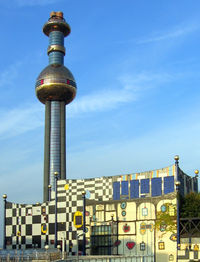
Photo from wikipedia
Abstract Hydrothermal carbonization of the organic fraction of municipal solid waste (OFMSW) could mitigate landfill issues while providing a sustainable solid fuel source. This paper demonstrates the impact of processing… Click to show full abstract
Abstract Hydrothermal carbonization of the organic fraction of municipal solid waste (OFMSW) could mitigate landfill issues while providing a sustainable solid fuel source. This paper demonstrates the impact of processing conditions on the formation and composition of hydrochars and secondary char of OFMSW. Harsher conditions (higher temperatures, longer residence times) decrease generally the solid yield while increasing the higher heating value (HHV), fixed carbon, and elemental carbon. Energy yields upwards of 80% can be obtained at both intermediate and high temperatures (220 and 260–280 °C), but the thermal stability and reactivity of the intermediate hydrochars suggest the formation of a reactive secondary char that condenses on the surface of the primary hydrochar. This secondary char is extractable with organic solvents and is comprised predominantly of organic acids, furfurals and phenols, which peak at 220 and 240 °C and decrease at higher carbonization conditions. The HHVs of secondary char are significantly higher than those of primary char.
Journal Title: Fuel
Year Published: 2018
Link to full text (if available)
Share on Social Media: Sign Up to like & get
recommendations!